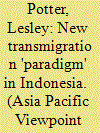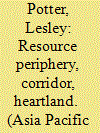| Srl | Item |
| 1 |
ID:
117140


|
|
|
|
|
| Publication |
2012.
|
| Summary/Abstract |
Transmigration from Java to rural areas of the 'outer islands' appeared finished in Indonesia after the fall of the Suharto regime in 1998 and decentralisation in 2001. However, the rapid growth of oil palm plantations in the past decade has led to a renewed call for transmigrants by district heads seeking an expanded labour force. A new system has evolved on a district-to-district basis with applicants in 'sending districts' (in Java, Bali and the poorer provinces of East and West Nusa Tenggara) being matched to requests from 'receiving districts' (in Sumatra, Kalimantan, Sulawesi and Papua), which largely depend on levels of plantation investment near proposed new transmigration sites. Coordination is in the hands of a rebranded central Ministry of Manpower and Transmigration. Integral to the 'spatial' organisation of the new transmigration will be the creation of towns or cities, known as KotaTerpadu Mandiri ('Integrated self-sufficient city'). A new transmigration region (with its oil palm plantations) will form the 'embryo' for the city's growth. Although these arrangements will aim to reduce poverty, their social and environmental costs have not been evaluated. Examples of these new schemes in parts of Central Kalimantan are discussed, with brief comparisons of earlier transmigration projects.
|
|
|
|
|
|
|
|
|
|
|
|
|
|
|
|
| 2 |
ID:
088017


|
|
|
|
|
| Publication |
2009.
|
| Summary/Abstract |
The long borderland in Kalimantan between Indonesia and East Malaysia is partly mountainous and environmentally unique, its three national parks forming the core of a tri-nation 'Heart of Borneo' initiative proposed by environmental NGOs and ratified in 2006. More accessible lowlands in West Kalimantan and the north of East Kalimantan constitute a typical 'resource periphery' in which strategic considerations, persisting through the Suharto years, now intersect with a range of new political, economic and cultural demands. A perception by the central government of increasing lawlessness in the borderlands arose in the turbulent years following Suharto's fall, during 'reformasi' and the beginnings of decentralisation. In addition to smuggling and illegal logging, contests over land use erupted at various scales. Proposals to construct an oil palm corridor along the border, begun by the Megawati government and extended by some sectors of the Yudhoyono regime, were part of a quest for greater legibility and control on the part of the central authorities. The paper specifically examines the power struggles that arose over that project and its inevitable outcome, a central government back down. However, the current palm oil boom is bringing new corporate planting, which may eventually succeed in 'taming' the borderlands.
|
|
|
|
|
|
|
|
|
|
|
|
|
|
|
|